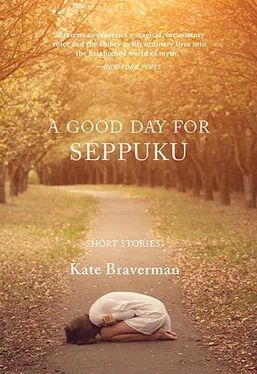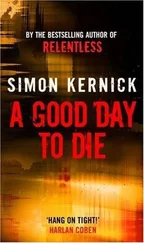The country folk bring Dr. Sutter deer and lamb meat, chickens, and bags of corn, tomatoes and carrots. They bake breads and blueberry pies. When they come to town, they stop by the clinic with baskets of eggs, jars of applesauce and milk in gallon jugs. It isn’t payment for services rendered, they’re all in debt, but token offerings acknowledging his father as intrinsic to Wood’s End. The clinic is part of the spine of the town — necessary as JJ’s General Store, the sheriff’s office, United Methodist, St. Stephens, and the post office.
His father gives the meat to Sheriff Murphy. His mother doesn’t want flowers and she refuses to make stews. She’s a vegetarian. The storeroom is littered with Mason jars of decaying Irises, and Lavender and Mint are buried beneath the acrid smell of alcohol, Betadine, astringents and pipe and cigarette tobacco. Ivermectin for the horses is a subtle and insistent musty scent like apples in mud. Pink antibiotic leaks from gallon bottles and looks like bubblegum.
The clinic storeroom is off limits. His father smokes cigarettes in secret there and paces in circles. He keeps his files on the floor and can immediately locate what he needs. He’s memorized precisely where each case is — baskets of roses gone stiff, foul eggs and collapsed tomatoes form a perimeter along the back wall. There’s one oak cabinet and it is locked.
Then there’s an outbreak of bluetongue that could kill off half the sheep in the county and his father leaves for a week. Goats stop eating, get infested with worms and turn mean from arthritis. The fields are actually composed of wounds, abscesses, dysentery and viruses, foot rot, liver flukes and lesions.
His father picks up his doctor’s bag and dozens of keys sway between his fingers. They’re held by a large bronze disc. It’s the Governor General’s Gold Crescent Award. His father drilled a hole in it to accommodate all his keys. He has keys for the clinic and storeroom, the locked oak cabinet, the house and Buick, and numerous small silver and gold keys in odd shapes he doesn’t recognize. Tommy assumes they’re for camouflaged doors his father keeps hidden. The tiny keys are delicate and look designed to fit jewelry boxes and dollhouses. Or mailboxes in other counties.
Sometimes his father has to go to the horse farm outside Harrisburg. He’s signed a contract, after all. They have seventy thoroughbred racehorses and need him to examine a new arrival. Two horses are shivering. One is limping and off his feed. There is blood in the barn.
Sam Markowitz often telephones from Erie. He’s scheduled twelve surgeries in three days, and he’s desperate. He begs his father for help. Sam is seventy-nine. He has glaucoma and his hands tremble. Latex gloves give him hives, he wheezes and can’t breathe. Poor Sam can’t retire. His wife has cancer and Sam has to keep up their insurance. His father can’t refuse. Then he might drop by Cornell for an emergency conference on rabid red fox and rabid raccoons. A frat kid got bitten and the trustees funded a research grant six hours later.
“All frats are naturally rabid,” his father observes. “This kid’s a business major with a room temperature IQ. I wouldn’t give him a tetanus shot. Truth is, I wouldn’t give him a tourniquet.”
Joshua Sutter has a reputation as a man of fierce convictions. When he makes up his mind, it doesn’t change. Some consider him arrogant and stubborn. But it’s generally agreed that he’s smart in an uppity way, and he has steady hands.
His father is 6’5” but seems larger. He uses his whole body unapologetically when he speaks. He bends his knees, and his hips move side to side as if performing a two-step. He spreads his arms wide for emphasis and his limbs punctuate the air.
Joshua Sutter has a melodious voice and a deliberately slow delivery. His movements are calculated and languid. He wants to be certain you see him coming. His father rarely raises his voice. He’s committed to the discipline of modulation. He claims it’s part of being professional.
His father’s red hair is long, past his neck, and falls around his face in ropey tendrils like kelp. Tommy thinks his father’s hair is a distraction — like the red cape of a matador and the misdirection of magicians.
Joshua Sutter is given to overly nonchalant entrances and exits that conceal quiet flourishes. His father actually has a repertoire of sly moves. He’s sleek and subtle and travels inside shadows. His Buick is the color of winter. It has 300,000 miles on it, and a bumper sticker that says Make Love Not War.
His father is always getting in or out of the Buick, humming “Tambourine Man” and “The Times Are A-Changing” with a corncob pipe jammed between his teeth. His riverboat gambler’s hat seems to float on top of his red hair, perched like a large nesting bird. His hat is ivory and made from shantung straw. Its wide brim conceals his forehead and bends at an angle, permanently shading his brow and left eye. He has black, red and white hatbands. Sometimes he wears his red and or black, triple-rose brocade vest, and has an entire drawer just for his sleeve garters.
His curls tangle and swirl like ocean waves he doesn’t bother to brush. He carries his doctor’s bag and suitcase in one hand, and presses a bottle of scotch to his chest with the other. Keys dangle from his middle fingers and a hundred dollar bill is folded into a little square in his palm. When they shake hands, the money transfers to Tommy’s palm and adheres to his skin.
“Keep yourself in feed,” his father says. “Have a problem, call 911.”
Just before he drives away, with the engine already running, his father motions him closer. This is the conclusion of their ritual. His father reaches in his pocket and presents him with a silver dollar. “Buy a lottery ticket,” he advises. Then the car is gone.
Tommy believes his father can will himself into invisibility. He’s magical and his doctor’s bag and big brown leather suitcase are somehow suspicious. His father is a circus with rings of acrobats, clowns, strong men and limping horses smelling like rained-on apples. He’s the grand master. His suitcase must be filled with confetti, ready to burst in a storm of gold flecks, and silver sparkle fireworks that could escape and resound like ricocheting bullets. Then plumes of purple smoke would pour through the house and into Lincoln Street. He has miniature missiles in his suitcase, and milk snakes coil in his folded brocade vests and sleeve garters. His father invented the universe. Time didn’t exist until he devised watches and clocks.
Tommy thinks his father can pull rabbits and lambs from his special riverboat gambler’s hat. He can extract water buffalo, mammoths, and make golden eagles fly from his hands.
Tommy frequently examines the Buick. He’s disappointed when nothing is added or subtracted. He knows precisely what’s in the trunk — remnants of a tool kit, a parka, card decks, playing chips from the Flaming Arrow Indian Casino south of Altoona, a Frisbee, and two bottles of scotch. In the glove-box his father keeps chocolate bars, two cartons of Marlboro 100 cigarettes, and his expired driver’s license.
Tommy watched his father install a cassette player. But he didn’t buy anymore cassettes. He only plays three tapes — The Best of Bob Dylan , The Best of Frank Sinatra and The Best of Cream . On a recent reconnaissance, Tommy realized his father doesn’t have a single map in the car.
“Maps are for people who care where they’re going,” his father said, corncob pipe in his mouth, hat covering his forehead. Then he’s walking out to the gray Buick that’s so identical to the gray air, it’s camouflaged.
Tommy Sutter spends his boyhood in the vast green chambers of the forest that begins at the backyard gate. The forest is an inland sea with wind currents the texture of waves. He’s disguised and protected here. Trees are mysterious and practice their own forms of sorcery. They communicate with gestures revealing their intentions. They are agile mutes and natural mimes. Their language evolves seasonally. Branches sway suggestively to one side, offering a deer path he follows, zigzagging to the creek beneath stands of sepia and glazed young oaks.
Читать дальше






![Джон Харгрейв - Mind Hacking [How to Change Your Mind for Good in 21 Days]](/books/404192/dzhon-hargrejv-mind-hacking-how-to-change-your-min-thumb.webp)





